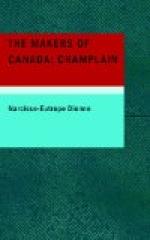In the year 1635 Champlain was taken ill, and died on Christmas Day, after having devoted forty years of his life to the promotion of the religion and commercial interests of the land of his ancestors, but he bequeathed to the Canadian people the priceless heritage of Quebec, and the memory of a pure and honest heart.
Before Champlain’s death, however, Quebec had commenced to develop. On the Beauport coast might be seen the residences of many of the settlers who arrived from the province of Perche in 1634. On the shores of the river Lairet, the Jesuits had built a convent, where the young Indians received instruction; and agriculture had received some attention. Robert Giffard had established a colony at Beauport which formed the nucleus of a population in this section of the country. Near Fort St. Louis the steeple of Notre Dame de la Recouvrance gave witness that Champlain had fulfilled his promise to build a church at Quebec if the country was restored to her ancient masters.
The colony was now entering upon an era of prosperity, and that harmony and happiness which Champlain had longed for in his life, and which occupied his thoughts even in death, were destined to be realized.
N.E.D.
CHAPTER I
CHAMPLAIN’S FIRST VOYAGE TO AMERICA
Samuel Champlain, the issue of the marriage of Antoine Champlain and Marguerite Le Roy, was born at Brouage, now Hiers Brouage, a small village in the province of Saintonge, France, in the year 1570, or according to the Biographie Saintongeoise in 1567. His parents belonged to the Catholic religion, as their first names would seem to indicate.
When quite young Samuel Champlain was entrusted to the care of the parish priest, who imparted to him the elements of education and instilled his mind with religious principles. His youth appears to have glided quietly away, spent for the most part with his family, and in assisting his father, who was a mariner, in his wanderings upon the sea. The knowledge thus obtained was of great service to him, for after a while he became not only conversant with the life of a mariner, but also with the science of geography and of astronomy. When Samuel Champlain was about twenty years of age, he tendered his services to Marshal d’Aumont, one of the chief commanders of the Catholic army in its expedition against the Huguenots.
When the League had done its work and the army was disbanded in 1598, Champlain returned to Brouage, and sought a favourable opportunity to advance his fortune in a manner more agreeable, if possible, to his tastes, and more compatible with his abilities. In the meantime Champlain did not remain idle, for he resolved to find the means of making a voyage to Spain in order “to acquire and cultivate acquaintance, and make a true report to His Majesty (Henry IV) of the particularities which could not be known to any




